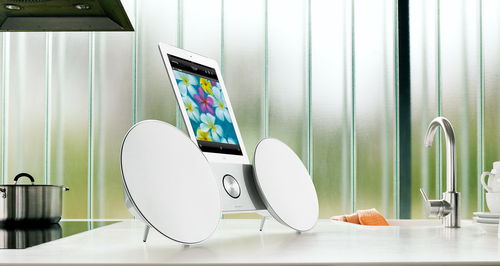
It really is shocking that Apple has pulled so far ahead of every other device maker with designs that are more art than technology focused. For those of you familiar with Bang & Olufsen products (BeoSound 8 pictured above) you know in some ways Apple’s designs are a copy of this iconic audio manufacturer meaning Apple didn’t entirely invent cool looking consumer electronics devices and others should be able to compete effectively in the space.
I am sure Microsoft agrees but as they’ve watched Apple become the cool and fast growing computer company they used to be, they determined they need to be more like Cupertino. This of course is the reason the company decided it was more important to design new hardware than keep their partners churning out directly competitive products happy.
With the Microsoft Surface Tablet introduction they told the entire ecosystem at once – you suck.
Steve Ballmer’s recent shareholder letter spells it out further. In it he says:
There will be times when we build specific devices for specific purposes, as we have chosen to do with Xbox and the recently announced Microsoft Surface. In all our work with partners and on our own devices, we will focus relentlessly on delivering delightful, seamless experiences across hardware, software and services. This means as we, with our partners, develop new Windows devices we’ll build in services people want.
The key word above is “delightful.” Whether buyers consider this upcoming tablet to be accurately described by this term remains to be seen but the comment reinforces the “you suck” comment to partners as it suggests they can’t build such products.
Continuing, Ballmer says:
A great example of this shift is Windows 8. Windows 8 will come to market Oct. 26, 2012, with beautiful hardware that will light up with our consumer cloud services. Windows 8 unites the light, thin and fun aspects of a tablet with the power of a PC. It’s beautiful, it’s functional, and it’s perfect for both personal and professional use. Xbox Music, Video, Games and SmartGlass apps make it possible to select a movie from a PC, start playing it on the TV, and finish watching it on a phone. SkyDrive, our cloud storage solution, effortlessly connects content across a user’s devices. Bing’s powerful search technologies in Windows 8 will help customers get more done. Skype has a beautiful new Windows 8 app and connects directly into the new Office.
The idea here is to use Skype and Bing as differentiators against Apple. The problem is how is Microsoft better able to integrate search and Skype than Apple? To keep its value, Skype has to run on Apple hardware and if its inferior on Apple’s platform, users may just switch to FaceTime which can easily be augmented to compete with “Skype Out” and other features.
Moreover, I have used SkyDrive and the product needs work. It seems to have been designed by sadistic engineers. Moreover the duplication between LiveMesh and SkyDrive was beyond confusing and multiple URLS made the experience really painful for me as I tested the service. If Microsoft is serious about the cloud they need to make life easier for users.
Here is another salient comment from the Microsoft head:
Fantastic devices and services for end users will drive our enterprise businesses forward given the increasing influence employees have in the technology they use at work — a trend commonly referred to as the Consumerization of IT. It’s one more reason Microsoft is committed to delivering devices and services that people love and businesses need.
Yet another statement of the inferiority of the current hardware on the market.
If we are to assume that Surface is a hit and Microsoft starts to regain traction – two big ifs, the job will only be partly done by Redmond. You see the company needs to regenerate excitement around its brand. Xbox Kinect is a spectacular product but doesn’t create the excitement of Apple. Ballmer needs a cult-like following for Surface and they will likely have to create a Surface phone which needs a similar following. And from there the company is going to have to make sure they push the Ultrabook market which has no identity despite many of them – especially those from Asus being incredible machines.
Ballmer sums up the opportunities which lie ahead for Microsoft as follows:
- Developing new form factors that have increasingly natural ways to use them including touch, gestures and speech.
- Making technology more intuitive and able to act on our behalf instead of at our command with machine learning.
- Building and running cloud services in ways that unleash incredible new experiences and opportunities for businesses and individuals.
- Firmly establishing one platform, Windows, across the PC, tablet, phone, server and cloud to drive a thriving ecosystem of developers, unify the cross-device user experience, and increase agility when bringing new advancements to market.
- Delivering new scenarios with life-changing improvements in how people learn, work, play and interact with one another.
The challenge here is just how generic these talking points are. They can apply to Google, Apple and Samsung as well. The monopoly position which Microsoft enjoyed is quickly eroding because there are hundreds of thousands of Android and iOS apps on the market. To make matters worse, as the world moves to the cloud, HTML5 browsers will allow cloud-based apps to be nearly as or as powerful as native OS apps.
Then there is WebRTC which will allow every browser to become the equivalent of a Skype client meaning any web user can communicate using voice and video with any other web user and no specific software will be required.
In short, this annual report letter from Microsoft is excessively generic and doesn’t explain the risks to Microsoft’s client business if they aren’t able to execute a successful tablet and mobile strategy. Moreover, as the cloud grows in importance they risk losing even more of their lock on the end-user client market.
Then there is the store strategy. It is apparent Microsoft needs bustling stores to compete with Apple and this means Surface has to be a hit and be followed up by killer phones and Ultrabooks people stand in line for.
Ballmer infers the future will be “delightful” but there is no telling if consumers will buy into this strategy. We should know more after the Surface Tablet becomes available. If it is a flop, it may not be a bad idea to start acquisition discussions with Bang & Olufsen – at least this way Redmond can’t be accused of copying Apple’s designs.





